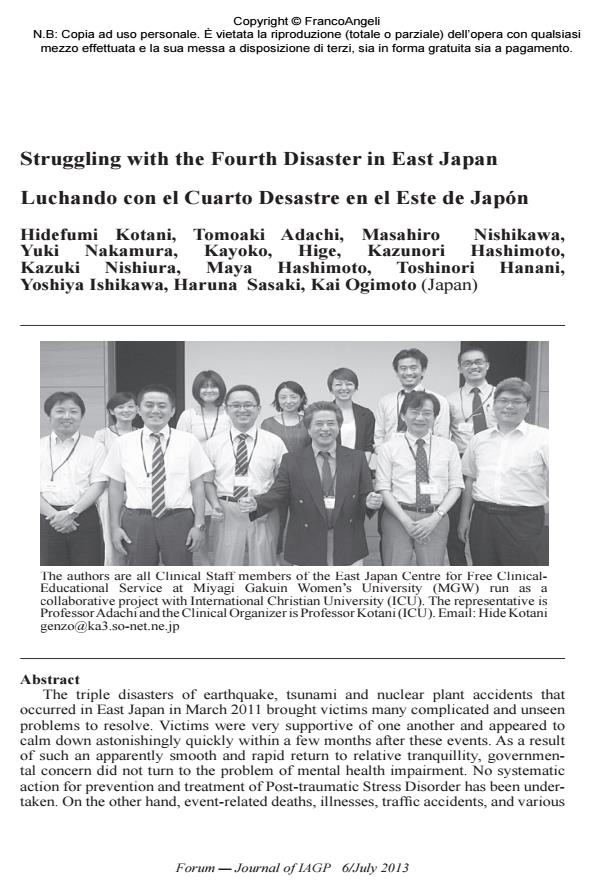Struggling with the Fourth Disaster in East Japan
Journal title FORUM
Author/s Hidefumi Kotani
Publishing Year 2014 Issue 2013/6
Language English Pages 21 P. 79-99 File size 1721 KB
DOI 10.3280/FORU2013-006009
DOI is like a bar code for intellectual property: to have more infomation
click here
Below, you can see the article first page
If you want to buy this article in PDF format, you can do it, following the instructions to buy download credits

FrancoAngeli is member of Publishers International Linking Association, Inc (PILA), a not-for-profit association which run the CrossRef service enabling links to and from online scholarly content.
Co authors of the article: Tomoaki Adachi, Masahiro Nishikawa, Yuki Nakamura, Kayoko, Hige, Kazunori Hashimoto, Kazuki Nishiura, Maya Hashimoto, Toshinori Hanani, Yoshiya Ishikawa, Haruna Sasaki, Kai Ogimoto<br/><br/> The triple disasters of earthquake, tsunami and nuclear plant accidents that occurred in East Japan in March 2011 brought victims many complicated and unseen problems to resolve. Victims were very supportive of one another and appeared to calm down astonishingly quickly within a few months after these events. As a result of such an apparently smooth and rapid return to relative tranquillity, governmental concern did not turn to the problem of mental health impairment. No systematic action for prevention and treatment of Post-traumatic Stress Disorder has been undertaken. On the other hand, event-related deaths, illnesses, traffic accidents, and various destructive problems seem to be occurring with increasing frequency in communities located in the stricken area. Victims do not take advantage of what mental health support is available, preferring to maintain their silence regarding their disaster experiences even when mental health care teams visit them directly. Mental health services for victims of the triple disasters have now become quite hopeless and helpless since traditional psychiatric treatment approaches have not worked well. A practical study aimed at opening a gateway to clinical treatment for victims of the triple disaster is introduced in this paper. This sense of helplessness is conceptualized and analysed as a fourth disaster involving hidden social and cultural dynamics. New pre-therapy and support group therapy systems combined with community building approaches to encourage victims to seek necessary treatment are reported.
- Asahi Newspaper. (2011). Fukushima no Yasainoka ga jisatsu [Fukushima vegetable farmer committed suicide]. 29 March 2011.
- Asahi Newspaper. (2011). Nairikubu no Dam mo Kekkaishiteita: Fukushima Sukagawa 7 nin ga gisei. [The inland dam collapsed too. Seven people were sacrificed in Sukagawa-city, Fukushima]. May 2011.
- Asahi Newspaper. (2011). Syusyo Genpatsujiko Syusoku wo Sengen. [The prime minister declared an end to the world’s worst nuclear crisis]. 16 December.
- Freud, S., (1928). Humour. Standard Edition. London: Hogarth Press. 21: 161-166.
- Gutmann, D., (2012). The founding trauma: To accept it or transform it — The tragic case of Fukushima, Paper, 29th Annual Congress of the Japanese Association of Group Psychotherapy, 11 March 2012. Meiji University, Tokyo. (http://www.praxis-international.eu/uploaded/Fukushima%20Version%20finale%20IAGP%20Japan.pdf)
- Kotani, H. & Bonds-White, F., Eds. (2013). Creating safe space through individual and group psychotherapy. Tokyo: Institute of Psychoanalytic-Systems Psychotherapy Publication
- Nakanishi, M.& Tanoi, K., (2013). Agricultural Implications of the Fukushima Nuclear Accident. Tokyo: Springer.
- National Diet of Japan Fukushima Nuclear Accident Independent Investigation Commission (2012). Kokkai Jikocho Houkokusyo (Diet accident investigation commission report). Tokyo: Tokuma Syoten.
- NHK Fukushima (2013). NHK Special: 3.11 Anohikara Ima wo 2 nen Fukushima no ima wo shitteimasuka [It is two years from that 3.11 day, Now of Fukushima Do you know it?] March 9.
- Reconstruction Agency (2013). Fukko no Genjyo to Torikumi [The present conditions and action of the reconstruction].http://www.reconstruction.go.jp/topics/main-cat1/sub-cat1-1/20130528_sanko05.pdf
- Tujiuchi, T. (2012). Saitama Ken Shinsai Hinan Ankeito Cyosa Syuukei Kekka Houkokusyo [Saitama earthquake disaster refugee questionnaire survey count result report] http://saitamasogo.jp/wp-content/uploads/2012/05/SSN
Hidefumi Kotani, Struggling with the Fourth Disaster in East Japan in "FORUM" 6/2013, pp 79-99, DOI: 10.3280/FORU2013-006009